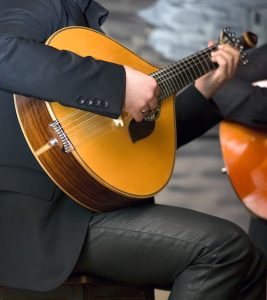 Fado is a Portuguese genre of music which oozes melancholy, feelings, and sadness. It dates back to Lisbon of the 1820s at least, but its origins lie much further back in history. The word ‘fado’ means fate or destiny, and the songs in fado are often stories of poverty, of the life in the sea, and of ‘saudade’, the Portuguese word for longing and a nostalgic feeling. Fado is still very popular in Portugal, and its importance and originality was recognised by UNESCO, who added it to its list of Intangible Cultural Heritage in 2011.
Fado is a Portuguese genre of music which oozes melancholy, feelings, and sadness. It dates back to Lisbon of the 1820s at least, but its origins lie much further back in history. The word ‘fado’ means fate or destiny, and the songs in fado are often stories of poverty, of the life in the sea, and of ‘saudade’, the Portuguese word for longing and a nostalgic feeling. Fado is still very popular in Portugal, and its importance and originality was recognised by UNESCO, who added it to its list of Intangible Cultural Heritage in 2011.
For music lovers, a trip to Lisbon should absolutely include visits to some of the numerous bars and venues where one can hear fado. Many small bars have amateur singers, but it is also worth checking out if some big names happen to have shows in Lisbon at the time of one’s visit. Some of the most famous fado singers are Amália Rodrigues, Dulce Pontes, Mafalda Arnauth, António Zambujo, Ana Moura, Helder Moutinho, Carminho, Mísia, Cristina Branco, Gisela João and Katia Guerreiro.
Where to listen to Fado in Lisbon
Restaurant Clube de Fado in Santa Maria Maior is a historical fado venue that features some big names of fado while serving traditional Portuguese dishes. It is worth a visit for those seeking an authentic historical feel and high quality fado. A Baiuca in Alfama in contrast is a place for the locals. It is affordable, not so touristy, and its fado singers are amateurs. To get a glimpse of Lisbon’s current fado scene, it is a truly authentic place. Tasca do Chico in Bairro Alto is a very popular place which has both amateurs and established singers performing. It serves plates of cheese and meats which make a great appetiser with local wine before dinner.